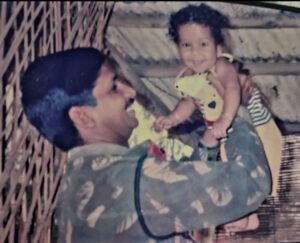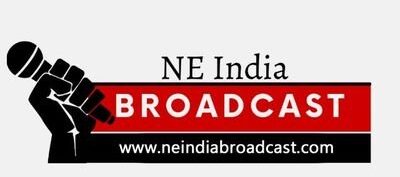Colonel Dharmesh Chandra is an alumnus of the Rashtriya Indian Military College and a distinguished officer of the 8 Gorkha Rifles of Indian Army. Over his illustrious military career, he has served across diverse operational terrains, including a tenure with the United Nations Peacekeeping Forces in Sierra Leone under Chapter VII.
Here he shared some incidents and cozy talk about his military career with me.
Lessons from the LoC:The Buddy System:Trust Over Tyranny:
On the LoC, survival depended on systems, not sheer force. One frigid winter night, Arjun’s unit was ambushed. Bullets whizzed past as he dove for cover, but his buddy, Vikram, yanked him behind a boulder just in time. “Stay sharp, Kapoor!” Vikram had barked, though his eyes betrayed relief. The military’s “buddy system” wasn’t just about safety—it was about trust. Soldiers were never alone; they shared rations, risks, and even fears. In the corporate world, Arjun realized, employees were often isolated, pitted against deadlines and each other.
How could they thrive without trust?
Duty Rotations:The Rhythm of Resilience:
No soldier guarded the post indefinitely. Shifts were staggered—four hours on, four hours off—to maintain sharpness. Rest was sacred.Yet here, in this glass-and-steel fortress, employees were expected to grind endlessly, like machines.Arjun remembered a young lieutenant who’d collapsed from exhaustion during a marathon watch.The commander’s response? “You’re no good to anyone dead. Rest, then return.”
The military understood: sustainability required balance.
Home is where the Heart is letters and photos were lifelines on the LoC, whether it was photos of her or their four month old toddler, Priya always surprised.
Arjun once received a crumpled note from Priya, during a particularly brutal stretch. “Come home safe,” she’d written. “And stop leaving your socks on the floor.” He’d laughed, the sound foreign in that desolate place.Priya’s face, holding Sunny, captured in a sun-faded photo tucked into his helmet, had kept him sane. Staring at it during lulls—her dimpled smile, the mischief in her eyes—was a ritual. Science might call it “oxytocin release”; soldiers called it “staying human.”
The Boardroom Battle:
The boardroom was silent, save for the rhythmic tapping of a pen against the polished mahogany table. Sunlight streamed through the floor-to-ceiling windows, casting sharp shadows over the faces of the executives. At the head of the table, CEO Marcus Hale—a man with a reputation for demanding results at any cost—leaned forward, his steely gaze sweeping the room.
“Productivity is down by 12% this quarter,” he announced, his voice as crisp as his tailored suit.“The solution is simple: extend work hours. Ten-hour days, six days a week. More hours mean more output.”A murmur rippled through the room. Some nodded, their expressions tight with resignation. Others shifted uncomfortably in their seats. Among them was Major Arjun Kapoor (Retd.), the company’s newly appointed Head of Operations. Arjun’s military bearing and quiet intensity had earned him respect, but today, his jaw clenched at the CEO’s proposal. “This isn’t a solution,” he thought. “It’s a surrender.” As the debate erupted—arguments about burnout, attrition, and quarterly targets—Arjun’s mind drifted to the snow-capped peaks of the Line of Control, where he’d spent years as a soldier. The lessons he’d learned there felt more relevant than ever.
The Human Cost of “Productivity”
Back in the boardroom, Marcus Hale’s voice cut through the noise.“Sentimentality won’t meet our KPIs, Kapoor. What’s your alternative?” Arjun stood, his posture straight, hands clasped behind his back. “Sir, forcing longer hours is like reducing road accidents by mandating bullock carts. It ignores the root problem.
True productivity requires systemic solutions.”

He outlined his visions:
Streamlined workflows to eliminate redundant tasks.
Flexible schedules with mandatory downtime.
Leadership training to replace micromanagement with mentorship.
“And trust,” he added.“Soldiers don’t follow titles; they follow leaders who share their burdens.”
Marcus scoffed. “This isn’t the army.”
“No,” Arjun said quietly. “But burnout is the enemy here too.”
A Commander’s Gambit:
The next morning, Arjun arrived early. On his desk lay a file: Project Recharge. He’d spent the night drafting a pilot program—rotational roles, mental health days and weekly “buddy check-ins.”
But first, he needed allies.He approached Sarah Lim, the sharp-tongued CFO. “You’ve lost three analysts this month,” he said.
“What’s the cost of replacing them?” Sarah’s eyebrows shot up. “Twice their salaries. Why?” “What if we kept them instead?” By lunch, Sarah was onboard. Next, Arjun cornered Rajesh, the cynical IT head. “Remember the Y2K panic?” Rajesh grumbled. “This feels the same.” “Except this time,” Arjun countered, “we’re fixing the system, not the symptom.”
The Power of Presence:
Weeks later, during a project crisis, Arjun did the unthinkable: he cancelled overtime.
“Go home,” he ordered his team. “Rest. We’ll regroup tomorrow.” The next day, fresh ideas flowed. A junior designer proposed a automation tool that cut processing time by half. “I thought of it while walking my dog,” she admitted sheepishly. Marcus Hale took note.
Clients and Camaraderie:
Productivity wasn’t just internal. During a tense client negotiation, Arjun invited the client’s team to a casual lunch—no agendas, just conversation. Over biryani, they bonded over shared struggles. The deal closed effortlessly. “You’re… different,” the client remarked. “We’re human,” Arjun replied.
Photo and Promise:
One evening, Arjun found Priya waiting in his office, her arms crossed. “You forgot our anniversary again,” she said, though her eyes sparkled. He grinned, pulling her close.“I was busy staring at your photo.” She swatted his arm, laughing. “Cheap excuse.” But as they left, she slipped a new photo into his desk drawer—a selfie of them both, mid-laugh. Now their toddler has reached college, about to be graduated.
The New Frontier:
A year later, the company’s profits soared. Turnover plummeted. Marcus Hale, now a convert, stood before the board. “Kapoor was right,” he admitted.
“Productivity isn’t about hours—it’s about heart.” The reforms became industry benchmarks. Reporters dubbed it “The LoC Model.” At his desk, Arjun glanced at Priya’s photo.
Somewhere on the LoC, a young soldier was staring at a similar picture, finding strength in a smile.
Epilogue: A Stare Worth a Thousand Words
At the annual gala, Arjun spotted Marcus Hale—unusually relaxed—gazing at his wife across the room. “Staring helps, doesn’t it?” Arjun teased. Marcus chuckled. “Only if you apologize for forgetting the dishes last week.”
The room buzzed with laughter, collaboration, and the quiet hum of a company reborn.
Following his premature retirement, he has transitioned into the corporate sector and is currently leading the Defence Banking business for a prestigious bank in East India.
(Pratyusha Mukherjee, an Independent Sr. Broadcast Journalist working for British media with 20 years of experience in covering the east and northeast, with specialisation in Defence and Sports.She is associated with us as Editorial head of Defence and Sports. In her illustrated career she has covered many major events and achieved International and Indian media awards for Journalism)

